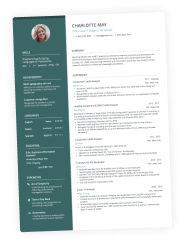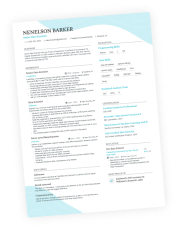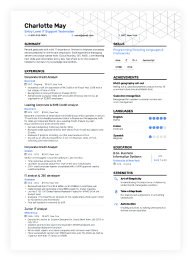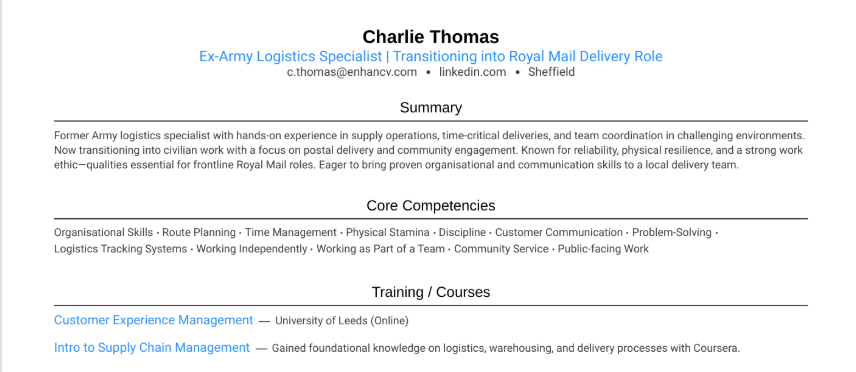Choosing the right skills for your CV is harder than it looks. You need to highlight what you’re great at, match what the employer’s asking for, and do it all without turning your CV into a crowded list of buzzwords.
Most job seekers either undersell their skills or include too much—and miss the mark entirely.
The good news? Once you understand what recruiters actually want to see, writing a strong skills section becomes far simpler.
This guide will show you how to identify the key hard and soft skills to put on your CV, how to present them clearly, and how to back them up with results.
And if you’re short on time, Enhancv’s CV Builder can help you choose, format, and tailor your skills to each job—without second-guessing every word.

Key takeaways
- Your CV should present a blend of hard, soft, and industry-specific skills tailored to the role you're applying for.
- According to LinkedIn’s Skills on the Rise report, the most in-demand skills include AI literacy, relationship building, strategic thinking, and data management.
- Use Enhancv’s CV builder to instantly align your skills with job ad requirements—no second-guessing needed.
- Always back up your skills with measurable achievements, tools used, or context that proves your impact.
- Avoid generic lists—group your skills strategically, use job-specific language, and prioritise relevance over quantity.
Want to see how your CV performs with applicant tracking systems? Run it through our free CV checker and get your score in seconds.
Is your CV good enough?
Drop your CV here or choose a file. PDF & DOCX only. Max 2MB file size.
What are key skills on a CV or resume?
Key skills are the abilities that show you’re equipped to do the job. They include both hard skills—like data analysis, coding, or project management—and soft skills such as communication, leadership, or adaptability.
Together, these skills give employers a quick sense of what you can contribute, both technically and interpersonally, especially when paired with the right keywords from the job description. The stronger and more relevant your skills section is, the easier it is for both applicant tracking systems (ATS) and hiring managers to spot your potential.
In the UK, “CV” is the standard term. But since many job listings and online guides use “resume,” we’ll refer to both throughout this article. The advice applies whether you’re applying locally or abroad.
CV skills fall into two main categories:
- Hard skills are measurable, often technical, and tied to tools, tasks, or qualifications.
- Soft skills are how you work with others, solve problems, and adapt—equally important but harder to quantify.
See how the two types compare in the table below:
Hard skills vs. soft skills
| ASPECT COMPARED | HARD SKILLS | SOFT SKILLS |
|---|---|---|
| What they are | Used to complete specific tasks or technical responsibilities | Interpersonal or behavioural traits that affect how you work and collaborate |
| Where they come from | Gained through education, training, certifications, or on-the-job experience | Developed over time through experience, reflection, and feedback |
| How they’re used | Directly applied to complete technical, analytical, or task-based responsibilities | Applied in people-facing, leadership, or decision-making situations |
| How they’re shown | CV sections like Skills, Experience, or Certifications with named tools or outcomes | Demonstrated through achievements, behaviour, or examples in your work history |
| Measurable by | Proficiency level, qualifications, output (e.g. speed, accuracy, completion rate) | Impact, behavioural change, recognition, or project success |
| Examples | Excel, JavaScript, financial modelling, CAD, Google Analytics | Communication, adaptability, time management, teamwork, critical thinking |
The best CVs use a mix of both skill types, aligned with job ad requirements.
As a general rule, lean more heavily on hard skills for technical or specialist roles, and highlight soft skills when applying for leadership, client-facing, or collaborative positions. We’ll break this down in more detail later on.
For now, let’s look at why your skill set matters so much to recruiters—and how they actually evaluate it when reading your CV.
Why recruiters care about skills
Skills are one of the first things recruiters look for—and increasingly, they’re becoming the main reason candidates get shortlisted.
As more companies shift to skill-based hiring, CVs are no longer judged solely on job titles or degrees. Hiring managers rely on skills to quickly filter CVs through ATS. These systems scan your document for specific keywords from the job description. If your skills aren’t clearly presented or tailored, you risk being filtered out before a human ever sees your application.

Skill-based hiring is here to stay
In our latest survey, one trend was impossible to ignore: employers are prioritising skills over titles or degrees.
While the data comes from our US users, the insights reflect a global shift, including in the UK job market.
- 81% of employers now use skill-based hiring methods.
- 91% of recruiters look for soft skills like leadership and critical thinking.
- 88% prioritise hard skills such as project management, Excel, or Python.
- Mentions of ChatGPT and AI tools on resumes have surged by 274% year-over-year, making them some of the fastest-growing in-demand skills.
As this trend continues, your ability to highlight the right mix of skills—clearly and convincingly—can make all the difference.
In short, your skill set is how recruiters connect the dots between your experience and their needs. That’s why how you choose, format, and back up your skills makes all the difference.
How to choose the right skills for your CV
Whether you're writing your first CV or updating one mid-career, choosing the best skills to put on a CV is all about relevance. Not every ability needs a spot on the page—just the ones that show you're a strong match for the role.
Here’s how to narrow it down:

Steps to find the right skills
- Start with the job ad: Highlight the skills listed under requirements or responsibilities. These are your keywords—include them if you genuinely have them.
- Research the company: Check their website and values page. A company that talks about innovation or teamwork? That’s your cue to include creativity or collaboration.
- Look at similar job listings: Compare a few ads for the same role. The skills that keep coming up are likely must-haves.
- Think about transferable skills: If you're new to the workforce or changing careers, focus on strengths like time management, communication, or adaptability—especially if you’ve used them in school, internships, or volunteering.
- Keep it relevant, not just impressive: Being fluent in three languages or knowing how to use complex tools is great, but only if the role values it. Every skill you include should support your ability to do that specific job.
How many skills should you list on a CV?
Aim for 8 to 15 skills, depending on your experience level. Entry-level candidates might stick to six to eight strong, relevant ones. More experienced professionals can include a few more. Just make sure each one earns its place.

Most job seekers are underselling their skills
In the survey quoted earlier, we found a big gap between what employers want and what candidates actually include.
- US job descriptions typically ask for around 20 relevant skills.
- Yet only 22% of applicants meet or exceed that number.
- The largest portion—32%—list just five to ten skills, which often isn’t enough to stand out.
- Tech and marketing professionals are more proactive, averaging 18 and 14 skills respectively.
Even if you're just starting out, showing a thoughtful combintation of technical and soft skills can help you outperform more experienced applicants.
To help you choose the right ones, we’ve compiled the most in-demand skills across industries—plus tips on how to use them effectively on your CV.
Let’s start with hard skills: the technical, job-specific abilities employers expect to see.
150+ hard skills to put on your CV in 2025
A strong display of hard skills is one of the top requirements UK employers expect—whether you’re applying for roles in tech, finance, healthcare, marketing, or beyond. These are the technical, task-oriented abilities that prove you can do the job—and do it well.
To make this list easier to explore, we’ve grouped the most relevant practical skills into categories. Each group reflects a set of closely related competencies that employers often expect to see together.
For example, if a job ad mentions “data analysis,” they may also be looking for skills like SQL, Excel, or Python—tools that support that core function. Presenting your skills this way gives your CV depth, shows range, and helps recruiters see how your abilities connect.
Let’s take a closer look at the top hard skills to feature on a CV.
Technology and programming skills
Also known as technical skills, these are essential for roles in software development, IT, and digital industries—but they’re showing up in more job specs than ever. Employers want to see that you can work with modern tools, write or understand code, and adapt to new technologies.
If a role mentions frameworks or programming languages, list the ones you’ve used confidently in past projects, placements, or personal work. And make sure the skills you include match the level and relevance the job ad calls for.

Top 20 tech skills for your CV
- Python
- JavaScript
- HTML
- CSS
- Java
- C++
- C#
- TypeScript
- PHP
- Ruby
- React
- Angular
- Vue.js
- Node.js
- Git / GitHub
- SQL
- Bash / Shell scripting
- Docker
- Kubernetes
- REST APIs
AI skills for CVs
As AI adoption accelerates across industries, employers are looking for candidates who understand how to apply it—not just talk about it. Whether you're in tech, data, product, or operations, showing AI literacy on your CV can give you a major edge.
But it’s not just about listing tools—it's about confidence and adaptability. According to a recent Writer AI report, 41% of Millennial and Gen Z employees say they’ve resisted or sabotaged AI at work, often due to concerns over job security or poor implementation. That highlights a growing gap: companies need people who can embrace AI, not fear it.
If you’ve taken a course, built a model, or used AI in a real project—even a personal one—don’t hesitate to list it. The ability to work with (and not against) AI is already a career differentiator.

Top 20 artificial intelligence skills
- Machine learning (ML)
- Natural language processing (NLP)
- ChatGPT
- Prompt engineering
- TensorFlow
- PyTorch
- OpenAI API
- Computer vision
- Deep learning
- Reinforcement learning
- Generative AI
- Stable Diffusion
- Scikit-learn
- Large Language Models (LLMs)
- Model fine-tuning
- Hugging Face
- LangChain
- AI data labelling
- AI model evaluation
- Ethics in AI
Data analysis skills
From finance and healthcare to marketing and retail, data analysis has become a core skill across almost every industry. Employers want candidates who can make sense of numbers, spot trends, and turn data into decisions.
Whether you're applying for a data-specific role or just need to show analytical thinking, these are the go-to skills to highlight.

Data analysis on a CV
Cloud computing and cybersecurity
With more companies shifting to cloud-based systems and remote work models, demand for cloud and security expertise is higher than ever. Whether you're applying for a tech role or supporting infrastructure in another department, these skills show you understand modern digital environments—and how to keep them secure.

Top 10 cloud and cybersecurity skills
- Amazon Web Services (AWS)
- Microsoft Azure
- Google Cloud Platform (GCP)
- Docker
- Kubernetes
- Network security
- Firewalls & VPNs
- Penetration testing
- Information security (InfoSec)
- Cloud infrastructure management
Financial skills
Whether you're applying for an accounting role or a position that involves budgets, invoices, or reporting, financial skills are essential. Employers want to see that you can manage numbers accurately, use key software, and make informed decisions based on data.
These skills are just as relevant for bookkeepers and analysts as they are for project managers and office administrators who handle day-to-day budgets or reporting.

20 finance and accounting skills for a CV
- Cash handling and till balancing
- Basic mental arithmetic / numeric accuracy
- Budgeting and forecasting
- Financial reporting
- Microsoft Excel (advanced functions, pivot tables)
- QuickBooks
- Xero
- Sage 50
- Account reconciliation
- Financial modelling
- Expense tracking
- VAT compliance (UK-specific)
- Month-end and year-end close
- Cash flow management
- General ledger accounting
- Payroll processing
- Regulatory compliance (e.g. HMRC reporting)
- Accounts payable and receivable
- Financial auditing support
- Use of accounting CRMs (e.g. Zoho Books, FreshBooks)
Design and creativity tools
Design skills aren’t just for graphic designers—they’re useful across marketing, product, UX, and even admin roles. Whether you’re creating visuals, presentations, or user interfaces, employers want to see familiarity with modern design tools and an eye for clear, accessible visuals.
If you’ve worked on social posts, pitch decks, app prototypes, or anything visual, list the tools you used. Bonus points if you can show the end result in a portfolio or personal site.

Design and UX skills and apps
- Adobe Photoshop
- Adobe Illustrator
- Adobe InDesign
- Canva
- Figma
- Adobe XD
- Sketch
- Procreate
- Affinity Designer
- CorelDRAW
- InVision
- Gravit Designer
- UX/UI design fundamentals
- Presentation design (PowerPoint, Google Slides, Keynote)
- Basic video editing (Adobe Premiere, CapCut, iMovie)
Workplace technology skills
Office and productivity tools are used in nearly every workplace, no matter the industry. For early-career applicants especially, listing tools like Google Workspace or Microsoft Teams shows you're ready to jump in and stay organised from day one.

Basic office and collaboration tools
- Microsoft Office Suite
- Google Suite
- Zoom
- Slack
- Asana
- Trello
- Notion
- Evernote
- DocuSign
- Airtable
- Dropbox
- Calendly
- Grammarly
Marketing skills
Marketing in 2025 is part data, part storytelling—and 100% driven by tech. According to HubSpot’s latest State of Marketing report, 71% of marketers say it’s harder to meet customer demands than it was just a year ago.
That’s why employers are looking for candidates who not only know the tools, but can turn them into results. From CRM platforms to TikTok strategy, the right mix of marketing skills can set your CV apart.

Top 20 marketing skills for a CV
- Search Engine Optimisation (SEO)
- Search Engine Marketing (SEM)
- Google Analytics
- Google Ads
- Meta Ads Manager
- Email marketing (Mailchimp, Klaviyo)
- Content strategy
- Social media management (Hootsuite, Buffer)
- CRM platforms (HubSpot, Salesforce)
- Conversion rate optimisation (CRO)
- A/B testing
- Marketing automation (ActiveCampaign, Marketo)
- Influencer marketing
- Video marketing (YouTube, TikTok campaigns)
- Affiliate marketing
- Copywriting and blog writing
- Basic graphic design (Canva, Adobe Express)
- Event marketing and webinars
- Brand positioning & storytelling
- Performance reporting & KPIs
Certifications and licences
Certifications are the formal proof of your hard skills. They show employers you’re not just claiming a skill—you’ve been tested, assessed, and officially recognised for it. Whether it's project management, data analysis, or food safety, certifications validate your ability to apply job-specific knowledge in a real-world setting.
In the UK job market, qualifications like PRINCE2 and CSCS often appear as must-haves in job ads, especially in sectors where trust, compliance, or technical accuracy matter. If you've earned one, showcase it near the top of your CV—it could be what gets you past both the recruiter and the ATS.

Best certifications and licences for a CV in the UK
- PRINCE2 (Project Management)
- CSCS Card (Construction Skills Certification Scheme)
- CIPD (HR & People Management)
- NEBOSH (Health & Safety)
- ACCA (Chartered Accountancy)
- CIMA (Management Accounting)
- SIA Licence (Security Industry Authority)
- First Aid at Work (Health & Safety)
- PMP (Project Management Professional, globally recognised)
- City & Guilds qualifications (Trades, Construction, Teaching)
- Food Safety Level 2 or 3 (Hospitality & Catering)
- IELTS / ESOL (for non-native English speakers in regulated roles)
- Driving Licence – Full UK (Still requested in many field-based jobs)
- Teaching qualification (PGCE or QTS)
- Microsoft Certified: Azure Fundamentals / Office Specialist
Only list certifications that are still valid or relevant to the job you’re applying for. If it’s expired or unrelated, leave it off.
Language skills
Even if you’re applying for roles in the UK, employers often seek candidates who can communicate across cultures or support international expansion. It’s also a great way to show adaptability, learning capability, and interpersonal strengths.
To make your CV as useful as possible, list each language along with your level of proficiency, and if applicable, any standardised tests or certifications (like IELTS or DELE).

Language and proficiency indicators
- English (Native or IELTS/Cambridge certified)
- Spanish (DELE, SIELE)
- French (DELF/DALF)
- German (Goethe-Institut)
- Mandarin Chinese (HSK)
- Arabic (ALPT)
- Italian (CELI)
- Japanese (JLPT)
- Polish (in-demand in NHS and logistics roles)
- Portuguese (CELPE-Bras)
- Russian (TORFL)
- British Sign Language (BSL)
- European Framework Levels (A1–C2)
- IELTS (widely recognised in UK immigration and employment)
- TOEFL (primarily US-focused but globally respected)
90+ soft skills that set you apart
Soft skills might not come with a diploma, but they often tip the scale in your favour, especially in the UK job market. In fact, 67% of UK employers say they value soft skills more than formal qualifications, according to recent research by Indeed. Again, that shows a clear shift toward skills-based hiring, where how you work often matters more than what you’ve studied.
That’s why your CV should include more than just tools and tasks. It should show how you think, adapt, and contribute—because employers are looking for more than technical know-how. They’re looking for people.
Below, we’ve grouped the most valuable soft skills into key categories—each with a quick explainer to help you understand what employers are seeking, and how to demonstrate it on your CV.
Communication and presentation skills
Whether you’re replying to a client email, presenting project updates, or writing reports, communication is at the heart of almost every job. In the UK workplace, being able to communicate clearly, respectfully, and confidently is seen as a mark of professionalism—and poor communication is one of the top reasons teams struggle.
Employers want to see that you can adjust your tone, listen actively, and deliver your message in the right format—whether that’s a meeting, slide deck, or short Slack update.

Must-have communication and presentation skills
- Verbal communication
- Written communication
- Business communication
- Email communication
- Active listening
- Public speaking
- Presentation design
- Editing and proofreading
- Slides preparation
- Data visualization
- Tone adjustment
- Giving and receiving feedback
- Stakeholder communication
- Storytelling
Collaboration and teamwork skills
Being a good team player isn’t just about getting along with others. It’s about contributing to group success, resolving conflicts constructively, and helping the team hit shared goals. UK employers consistently rank collaboration as a top soft skill—especially in cross-functional, hybrid, or fast-paced environments.

Top collaborative skills
- Teamwork
- Collaboration
- Conflict resolution
- Reliability
- Accountability
- Cross-functional communication
- Mediation
- Initiative
- Delegation
- Respectfulness
- Empathy
Problem-solving and critical thinking
UK employers increasingly value people who can think clearly, stay calm under pressure, and find solutions, especially in roles that require autonomy or decision-making. These skills show that you’re not just task-oriented but able to navigate complexity and add real value.

Best problem-solving skills
- Critical thinking
- Analytical reasoning
- Creative thinking
- Decision-making
- Research and evaluation
- Attention to detail
- Root cause analysis
- Logical reasoning
- Troubleshooting
- Strategic thinking
- Stress management
Time management and organisation skills
Being good at your job isn’t just about what you do—it’s about when and how you do it. Time management and organisational skills show employers you can prioritise effectively, meet deadlines without drama, and keep chaos at bay. In UK workplaces where efficiency is prized, these skills are often what separates strong candidates from the rest.

Time management on a CV
- Prioritisation
- Scheduling
- Task management
- Goal setting
- Workflow planning
- Meeting deadlines
- Calendar management
- Multitasking
- Document organisation
- Project coordination
Leadership and people skills
You don’t need “manager” in your title to show leadership. Whether you’ve mentored a new starter, led a group project, or helped teammates stay motivated—employers are keen to see signs you can influence, support, and grow with others.
These skills matter at every career stage, not just in senior roles.

Top leadership and people skills
- Mentoring
- Coaching
- Delegation
- Team leadership
- Conflict management
- Motivation
- Influencing
- Accountability
- Vision-setting
- Performance feedback
- Change management
- Empathy in leadership
- Cross-functional collaboration
- Stakeholder management
- Inspiring trust
- Leading by example
- Conflict resolution
- Team development
- Cultural awareness
- Listening and coaching
Adaptability and innovation skills
In a job market that rarely stands still, employers are on the lookout for people who can roll with the punches—and even find new ways forward. Whether you’re navigating a company restructure, learning new tech on the fly, or spotting opportunities others miss, these skills show you're ready for change and not afraid to improve things.

Types of adaptability skills on a CV
- Flexibility
- Resilience
- Learning agility
- Creative thinking
- Open-mindedness
- Process improvement
- Experimentation
- Initiative
- Comfort with ambiguity
- Embracing feedback
Emotional intelligence and interpersonal skills
In many workplaces, especially customer-facing or collaborative roles, technical know-how will only get you so far. What sets top candidates apart is emotional intelligence—the ability to read a room and handle difficult conversations. These skills help teams run smoother and relationships last longer.

EQ and interpersonal skills
- Self-awareness
- Empathy
- Active listening
- Conflict sensitivity
- Stress regulation
- Rapport-building
- Patience
- Humility
- Giving and receiving feedback
- Relationship management
Negotiation and persuasion skills
Employers value candidates who can balance assertiveness with empathy and get others on board, without burning bridges.

Negotiation skills for a CV
- Influencing
- Active listening
- Conflict resolution
- Win-win thinking
- Confidence
- Emotional control
- Logical reasoning
- Stakeholder alignment
- Objection handling
- Strategic compromise
Most in-demand industry-specific skills
To really stand out, your CV needs to reflect not just general strengths, but the specific expertise your industry demands. We’ve rounded up eleven major UK sectors where employers are actively scanning for proven, targeted skill sets.
Let’s dive in.
Healthcare and social care
The UK’s ageing population, NHS pressures, and ongoing demand for carers and specialists make this sector a hub of opportunity. Whether you're applying for roles in nursing, support work, or medical administration, the right skills can set you apart, especially when you combine clinical expertise with compassion and efficiency.

Social care is booming—is your CV ready?
As of 2024, the adult social care sector in England employed approximately 1.59 million people, highlighting its significant role in the UK's workforce. With many employers hiring internationally and recruiting career switchers, transferable skills and clear documentation of certifications (e.g. Care Certificate, First Aid) become even more essential.

Top healthcare and social care skills for your CV
- Patient care and safeguarding
- Medication administration
- Clinical documentation
- First aid and CPR
- Infection control
- Care planning
- Empathy and active listening
- Knowledge of NHS systems (e.g., SystmOne, EMIS)
- Manual handling
- Multidisciplinary team collaboration
- Taking vital signs
- Health and safety compliance
- Electronic Medical Records (EMR) systems
- Basic life support (BLS)
- Phlebotomy
- Safeguarding adults and children
- Mental health support
- Multidisciplinary collaboration
- Record keeping and documentation
- Communication with patients and families
- Time-sensitive decision making
- Dementia care
- NHS systems (e.g. SystmOne, EMIS)
- End-of-life care
- Clinical governance understanding
Finance and accounting
Whether you're working in a small firm, the City, or the public sector, UK employers in finance expect a sharp eye for detail, regulatory awareness, and tech-savvy reporting. As more teams adopt cloud accounting and AI-based tools, combining traditional financial skills with software proficiency is key to staying competitive.

Most wanted skills in finance
- Budgeting and forecasting
- Financial reporting
- Payroll processing
- VAT and HMRC compliance
- Account reconciliation
- Financial modelling
- Sage / Xero / QuickBooks
- Microsoft Excel (formulas, pivot tables)
- Audit preparation
- Data-driven decision-making
Marketing and communication
From TikTok trends to CRM automation, the UK marketing landscape is evolving at breakneck speed. Today’s marketing pros need a well-balanced skill set: part creative, part analytical, and very tech-aware.

Top marketing and communications skills for your CV
- SEO & SEM
- Google Analytics & GA4
- Copywriting & storytelling
- Email marketing (e.g. Mailchimp, Klaviyo)
- Social media strategy (LinkedIn, Instagram, TikTok)
- Brand positioning
- CRM platforms (HubSpot, Salesforce)
- Influencer marketing
- Paid ads (Meta Ads, Google Ads)
- Conversion rate optimisation (CRO)
- Video editing (basic reels or full production)
- Market research
- A/B testing
- Content planning & editorial calendars
- Press release writing
- PR campaign planning
- Canva / Adobe Express
- Event promotion
- Internal communications
- Performance reporting
Education and training
Whether you're applying for a teaching assistant role or an instructional designer post, education jobs in the UK demand a wide range of transferable and subject-specific skills.
According to the Department for Education, the UK saw a 6% rise in vacancies across primary and secondary schools in 2024, reflecting an urgent need for skilled professionals who can manage classrooms and work within structured curriculum frameworks.

Еducation and training skills for CVs in the UK
- Curriculum planning
- Classroom management
- Safeguarding and child protection (e.g. Level 1 & 2)
- SEN (Special Educational Needs) strategies
- Differentiated instruction
- Behavioural support techniques
- Digital learning tools (e.g. Google Classroom, Seesaw)
- Assessment for learning (AfL)
- Lesson planning and delivery
- Ofsted readiness
- Individual Education Plans (IEPs)
- Phonics instruction (e.g. Read Write Inc, Jolly Phonics)
- Early Years Foundation Stage (EYFS) knowledge
- Continuing Professional Development (CPD) logs
- Exam preparation and moderation
- Interactive whiteboard tools
- Online safety and e-safety knowledge
- Positive reinforcement methods
- Pastoral care
- Basic First Aid (Paediatric, Emergency)
Engineering and manufacturing
From aerospace and automotive to clean energy and robotics, the UK's engineering and manufacturing sectors are critical to innovation and infrastructure. Employers seek candidates who combine technical know-how with hands-on problem-solving and safety awareness.
In fact, the UK will need 173,000 more engineers annually through to 2030 to meet demand and fill skills gaps.

Top 20 engineering and manufacturing skills to feature on your CV
- CAD software (e.g. AutoCAD, SolidWorks)
- Mechanical design
- Electrical engineering
- PLC programming
- CNC machining
- Lean manufacturing
- Quality assurance and control
- Health & safety compliance (e.g. COSHH, HSE regulations)
- Welding and fabrication
- Hydraulics and pneumatics
- Materials science
- Project management
- Root cause analysis
- Process optimisation
- Technical drawing interpretation
- Maintenance and repair
- Robotics and automation
- Assembly line operations
- 3D printing
- Product lifecycle management (PLM)
IT and software development
The UK tech industry is booming, with London ranked among the top global tech hubs. Whether you're coding, building systems, or managing digital infrastructure, IT and software development skills are in constant demand across startups, corporations, and public services.

Best IT skills for a UK CV
- Python
- JavaScript (including React, Angular, Vue)
- Java
- SQL / NoSQL databases
- HTML & CSS
- DevOps tools (Docker, Kubernetes, Jenkins)
- Git and version control
- RESTful APIs
- Agile and Scrum methodologies
- AWS / Azure / Google Cloud Platform
- CI/CD pipelines
- Cybersecurity best practices
- Unit and integration testing
- Mobile app development (iOS / Android)
- Object-oriented programming (OOP)
- Linux system administration
- Data structures and algorithms
- Cross-platform development (e.g. Flutter, Xamarin)
- Software architecture and design patterns
- Infrastructure as code (e.g. Terraform, Ansible)
Construction and skilled trades
From carpenters to quantity surveyors, skilled trades underpin much of the UK’s economy—and the demand keeps growing. In fact, nearly a quarter of UK construction employers report severe skill shortages, particularly in hands-on, technical roles.

In-demand construction-related skills for a CV
- Bricklaying
- Carpentry and joinery
- Plumbing and pipefitting
- Electrical installation
- Drylining
- Roofing
- Tiling and flooring
- Plastering
- Painting and decorating
- Scaffolding
- Welding and fabrication
- Blueprint reading
- Site health and safety (e.g. CSCS card awareness)
- Working at heights
- Tool and machinery operation
- Quantity surveying
- Groundworks and drainage
- Building regulations knowledge
- Concrete laying and shuttering
- First fix and second fix installations
Retail and customer service
Retail and customer-facing roles might not always require formal qualifications, but they demand a powerful combination of interpersonal, sales, and problem-solving skills.
Whether you're applying to be a shop assistant, store manager, or call centre rep, showing how you enhance customer experiences and drive results can set your CV apart.

Top skills in retail and customer service
- Customer relationship management (CRM)
- Point of sale (POS) systems
- Product knowledge
- Active listening
- Complaint resolution
- Upselling and cross-selling
- Visual merchandising
- Cash handling and till operations
- Stock management
- Order fulfilment
- Store opening and closing procedures
- Team collaboration
- Customer loyalty programmes
- Time management
- Queue management
- Multichannel support (in-store, phone, online)
- Gift wrapping and presentation
- GDPR awareness
- Returns and refunds handling
- KPI and sales target tracking
Transport and logistics
Whether you're managing supply chains, coordinating deliveries, or driving across the UK, the transport and logistics sector is powered by planning, precision, and people skills. Your CV needs to show you can keep things moving— literally and figuratively—by balancing efficiency, safety, and compliance with excellent coordination.

Transport and logistics skills for a CV
- Route planning and optimisation
- Vehicle maintenance and inspection
- Forklift operation and certification
- Inventory and stock control
- Supply chain coordination
- Freight and cargo handling
- Warehouse management systems (WMS)
- Delivery scheduling
- Load securing techniques
- Health and safety compliance (e.g. COSHH, LOLER)
- Tachograph use and legal driving hours
- Hazardous goods (ADR) awareness
- GPS and tracking systems
- Time-critical delivery management
- Communication with dispatch and clients
Hospitality and event management
In an industry where first impressions count and every detail matters, hospitality and events professionals need a well-rounded mix of practical, interpersonal, and organisational skills. Your CV should reflect your ability to deliver exceptional service, even when things get hectic.

Best hospitality and events skills
- Guest service and front-of-house management
- Event planning and coordination
- Food and beverage service
- Table setting and fine dining etiquette
- Health and safety standards (e.g. food hygiene certificates)
- Menu knowledge and upselling
- Booking and reservation systems (e.g. OpenTable, ResDiary)
- Venue setup and breakdown
- Hospitality software (e.g. EPOS, PMS like Opera)
- Conflict resolution and complaint handling
- Time management during peak hours
- Cash handling and POS systems
- Team coordination and shift leadership
- Multitasking in high-pressure environments
- Cultural sensitivity and multilingual communication
Real estate
Whether you're an estate agent, lettings negotiator, or property manager, real estate roles in the UK require a unique mix of sales, legal, and people skills.
The UK property sector contributes over £100 billion annually to the economy, and estate agency roles have remained consistently in demand across regions.

Best hospitality and events skills
- Property valuation and appraisal
- Residential and commercial sales
- Lettings and tenancy agreements
- Negotiation and closing deals
- Knowledge of UK housing regulations (e.g. EPC, Right to Rent)
- Conveyancing awareness
- Client relationship management
- Market research and pricing trends
- Listing and marketing properties (e.g. Rightmove, Zoopla)
- Photography and staging
- CRM software (e.g. Reapit, Salesforce)
- Landlord and tenant liaison
- Scheduling and conducting viewings
- Drafting contracts and documentation
- Time management and punctuality
Now that you’ve got a solid grasp of which skills employers value most—both generally and within your industry—it’s time to tackle the next big question:
How to list your skills on a CV (with examples)
When you present your skills on a CV, it has to be in a way that recruiters will notice and that ATS systems won’t overlook.
This section breaks it all down with real-life examples and simple formats that anyone—whether you’re entry-level or experienced—can follow. Simply writing “communication” or “team player” without context won’t cut it. What makes the difference is showing how you’ve used those skills.
Before we dive into formatting tips, let’s answer a common question: Do you really need a dedicated section for skills on your CV?
Not necessarily. You should always include skills on your CV, but they don’t always need their own section (sometimes they’re more effective when subtly woven into other CV sections instead). However, in many cases, it can seriously boost your chances of getting noticed.

How to decide if you need a separate skills section
- The job requires specific technical skills: Roles in IT, engineering, finance, or design often expect you to be fluent in certain tools or platforms. Listing these clearly (e.g. Python, AutoCAD, Xero) upfront saves recruiters from guessing.
- You’re changing careers: A dedicated section lets you highlight transferable skills like problem-solving or project coordination—even if your past experience doesn’t line up neatly.
- You have limited work experience: For students, recent grads, or people re-entering the workforce, skills often matter more than your job titles. Think coursework, volunteer roles, or personal projects.
- You want to boost your ATS scannability: Applicant tracking systems scan for keywords from the job ad. A well-organised skills section helps ensure your CV doesn’t get missed in the shuffle.
- You want to make things easy for recruiters: Time is short. A clear skills section (especially at the top) gives hiring managers a quick read on what you can do, without digging through your experience section.
Let’s look at how to present your skills clearly, strategically, and with just enough proof to make them stick.
Create a dedicated skills section
A strong CV skills section is a visual summary of what you bring to the table. When it’s structured clearly, it helps both recruiters and applicant tracking systems understand your core capabilities in seconds.
Here’s how to structure your skills section to stand out:

Steps to build a strong skills section on a CV
- Group skills into categories: Break them into logical headings like Technical Skills, Languages, or Tools & Platforms. It’s easier to scan and improves ATS readability.
- Put the most relevant skills first: Prioritise what matches the job description. This helps recruiters instantly see you’re a strong match.
- Use the employer’s language: Mirror phrases from the job ad (e.g. “data visualisation” vs. “data reporting”) to ensure your CV hits the right keywords.
- Be specific, not vague: Say “HubSpot” or “AutoCAD” instead of “marketing software” or “design tools”. Clarity shows confidence.
- Keep formatting clean: Use bullet points or tidy sidebars. Avoid cramming in too many skills—stick to 10–15 that best reflect your fit for the role.
- Add niche sections (e.g. Clinical Skills, Coding Languages, Project Tools) if your role calls for them. It shows focus and polish.
Tailor your skills to the role
No matter how impressive your skills are, a generic list won’t get you far. Employers want to see that you’ve taken the time to match your skill set to what they actually need.
Here’s how to choose the right skills for each job you apply for:

Steps to tailor your skills to each role
- Read the job advert carefully: Look for the must-haves, preferred skills, and how the employer talks about the role.
- Highlight skill keywords: Make note of the specific terms they use—whether it's "data analysis" or "client relationship management." These are what ATS systems and hiring managers will look for.
- Map your examples to those skills: Think about where you’ve used the same (or very similar) skills in your past roles, studies, or projects—and get ready to show them off.
- Edit your CV for every application: Swap out skills that don’t apply and move your most relevant ones to the top. It takes a few extra minutes but makes a big difference.
- Pro Tip: Use Enhancv’s CV tailoring tool to scan job descriptions and surface the most relevant skills instantly—so you know what to include before you even start editing.
Let’s put this into practice and show you how to align your skills section to a real-world job description.
Below is an example from a software engineer job posting:

Software Engineer
Media Engineering is an innovative organisation focused on delivering the best possible video playback experience, artwork, and metadata to customers worldwide.
The Tooling Ecosystem Team develops software solutions that enhance UI/UX frameworks, authentication, and web infrastructure—supporting the operator tools used across Media Engineering. Their mission is to seamlessly integrate user experience with robust security.
Key Responsibilities:
- Develop and maintain UI/UX frameworks to boost developer productivity.
- Support authentication integration with wider company login systems.
- Understand business needs and collaborate with partners to clarify evolving requirements.
- Contribute to core software projects using standardised team practices.
- Work closely with engineers to ship new features and resolve bugs.
- Foster a culture of innovation and collaboration.
- Build high-quality, maintainable software.
Required Skills and Qualifications:
- Frontend UI development with JavaScript and/or HTML/CSS.
- Desire to work in a fast-paced, start-up-style environment.
- Strong problem-solving and critical thinking skills.
- Solid written and verbal communication.
- Understanding of Agile methodologies and Git version control.
- Some experience in backend programming (Java or Python).
Preferred Skills:
- Experience with frameworks like React, Angular, or Node.js.
- API development.
- Familiarity with AWS and cloud infrastructure.
- Exposure to tools like Terraform, Jenkins, or Docker.
Education:
- Bachelor’s degree in Computer Science, Engineering, or related field—or equivalent experience.
In technical CVs, it’s a good idea to clearly label your hard skills in a Technical Skills or Toolbox section. Meanwhile, soft skills—like problem-solving or collaboration—can be naturally woven into your profile summary, work history, or achievements.
If a candidate matches most of the tools and frameworks mentioned above, here’s how they might translate that into a well-formatted CV section:
This is the simplest way to present tech skills on your CV, but it's not the only option.
Below, we'll explore other effective methods for listing and describing skills to help you set yourself apart.
Include key skills in other CV sections
A skills section is just one part of the picture. To truly convince recruiters, especially when it comes to soft skills, you need to show—not just tell—how you’ve used them.
Here’s how to naturally weave your key skills into the rest of your CV.
Skills in the experience section
Soft skills like leadership, communication, or adaptability are best backed by examples. Simply listing “leadership” won’t mean much unless you show what it looked like in action. The experience section is the perfect place to do that.
Look at an example from a marketing director’s CV where the candidate’s ability to lead teams is illustrated in the first bullet point:
- •Led a cross-functional team in the design and execution of inbound marketing strategies, achieving a 40% increase in qualified leads.
- •Managed budgeting and cost optimisation for marketing projects, resulting in a 20% decrease in expenses over two years
- •Developed strategic partnerships with media outlets and digital content creators to enhance brand presence.
Skills in the CV summary
A similar effect can be achieved in the profile section, be it a summary or an objective statement.
Take a look at how this math teacher highlights their adaptability and creativity directly in the CV summary:
Skills in the core competencies section
Your headline or core competencies section is another great place to demonstrate your biggest strengths and areas of expertise. Positioned at the top of your CV, these sections naturally draw the most attention.
Here’s an example from a skills-based CV:
Skills in a technical skills section
If you want to showcase your industry knowledge, you can organise and grade your proficiency levels in different areas.
With Enhancv’s AI CV Builder, this section looks like this:
Skills in the achievements section
Recruiters can quickly identify your qualifications when you feature them in a key achievements section.
Here’s how a project manager effectively handles this:
These achievements underline strong project management skills and technical problem-solving expertise, especially in process improvement and scalable solution implementation.
Quantify and validate your skills
Listing skills is one thing—proving them is what actually builds trust with hiring managers. Always connect your skill to a business result or improvement where possible. It’s crucial to go beyond the buzzwords and show your value clearly and confidently, using the techniques below:
- Use the STAR method: Structure examples around Situation, Task, Action, and Result. This helps you show how a skill was applied in context, not just claimed. For instance: “Led a team of 4 (Action) to deliver a rebranding project (Task) ahead of schedule (Result), improving campaign reach by 35% (Situation).”
- Add data where possible: Quantify the impact of your work. Numbers catch the eye and prove you're results-focused. For example: “Increased online orders by 28% after redesigning checkout flow.”
- Mention proficiency levels: Especially useful for technical skills and languages. It gives recruiters clarity on how well you know each skill. You could write: “Excel (Advanced – formulas, macros), Python (Intermediate).
- Cite relevant certifications: Official qualifications help validate your technical or specialised knowledge—particularly when changing careers or applying in regulated industries. Example: “NEBOSH General Certificate in Health and Safety (2023).”
- Include soft proof: Use achievements like promotions, peer recognition, or awards to show your soft skills in action. As in: “Voted ‘Most Supportive Colleague’ in internal team awards for mentoring new joiners.”
Mistakes to avoid when listing skills on your CV
Even strong candidates can fall short by how they present their skills.
Here’s what to watch out for:
- Listing too many skills: More isn’t better. Stick to 10–15 of the most relevant ones for the job. A cluttered list suggests you’re unsure what you’re good at.
- Being too vague: Generic terms like “collaborative” or “motivated” don’t say much on their own. Be specific: “Cross-functional team leadership” or “Client onboarding” gives more insight.
- Ignoring the job description: If your skills don’t reflect what the employer is asking for, you’ll look like a poor match—even if you're a great one.
- Mixing unrelated skills: Don’t put Photoshop next to stockroom organisation unless they’re both relevant to the role. Group similar skills together for clarity.
- Including outdated or basic tech: If a skill is now expected (like Microsoft Word), leave it out—unless the job ad specifically mentions it. Prioritise tools relevant to the role and industry.
- Exaggerating your level: Saying you’re an “expert” in Excel or Python invites scrutiny. Only claim high proficiency if you can back it up with examples.
Once you've listed your skills, read them through the eyes of a recruiter. If they sound generic, outdated, or mismatched, revise.
Frequently asked questions about CV skills
Still unsure how to list your skills—or which ones to prioritise? These quick answers cover what job seekers often ask when writing or updating their CV.
What are the top 5 skills employers look for in 2025?
According to ManpowerGroup’s 2025 Talent Shortage Survey, quoted by Prospects.ac.uk, the five most in-demand skill areas are:
- IT and data
- Operations and logistics
- Engineering
- Sales and marketing
- Front office and customer-facing roles
These reflect broad skill shortages across both technical and customer-focused sectors—so highlighting skills in these areas can give your CV an edge.
Should I list soft skills on my CV?
Yes—but don’t just name them. Support soft skills with examples or achievements (e.g. “Managed onboarding for three junior staff” shows leadership and mentoring). That way, they come across as credible and relevant.
Can I include skills I learned outside of work?
Absolutely. If you’ve picked up relevant skills through volunteering, courses, or personal projects, they count—especially for early-career applicants or career changers. Just be sure to tie them back to the role.
Should I use a separate skills section or list them under experience?
Ideally, do both. A dedicated skills section makes your strengths easy to scan, while integrating them into your work experience or summary gives them context and proof. Recruiters look for both.
What’s the best CV format for highlighting skills?
It depends on your situation:
- A combination CV format is ideal for most professionals. It features a dedicated skills section near the top, followed by your work history. This makes your key strengths easy to scan while still showing career progression.
- A skills-based CV (also called a functional CV) puts your skills front and centre, grouped under categories rather than listed by job titles. It’s especially useful if you’re changing careers, have gaps in your work history, or want to shift the focus away from specific job roles.
Both formats are ATS-friendly when done right—just make sure you still include keywords from the job advert and avoid long paragraphs.
Conclusion
A great CV doesn’t just list skills—it shows how you’ve used them. By combining hard and soft skills, you tell a more complete story of what you can do for a company. Focus on the skills that match the role, not your entire work history, and support each one with real examples, not vague buzzwords.
If you’re unsure where to start, Enhancv’s CV Builder can suggest role-specific skills and help you format them in a way that gets noticed.




